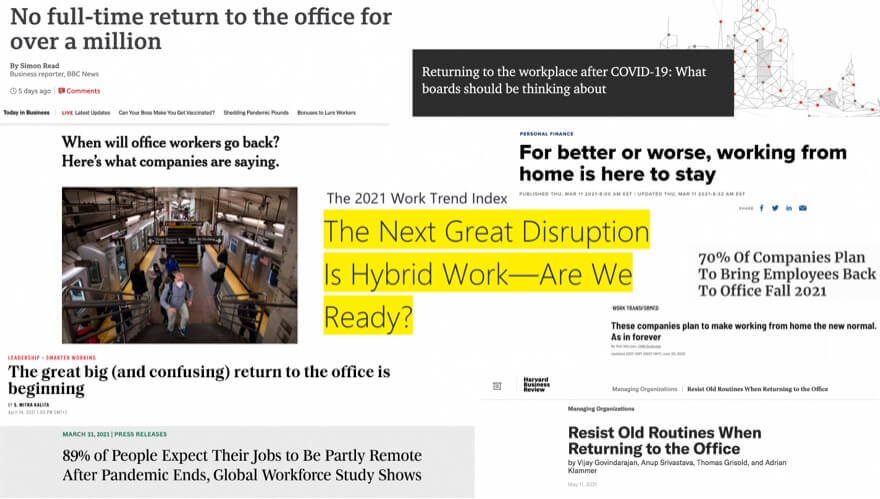The Future of Work: How Companies and Managers Can Thrive in a Hybrid World
 Image source: pexels.com
Image source: pexels.com
Today’s work environment looks different from any other time in the last 30 years. As companies confront pandemic lockdowns and economic disruption, industry leaders including Microsoft and Boston Consulting Group are figuring how to adapt and take advantage. The evolution toward both working in-person and working from home has gained traction, says BCG. According to Microsoft’s recent Work Trend Index, “flexible work is here to stay, and the talent landscape has fundamentally shifted”. Two thirds of leaders are considering redesigning their offices for hybrid work, and hybrid’s even more popular with employees: 73% want to retain remote working options. With knowledge workers able to work from anywhere, Microsoft CEO Satya Nadella says companies must rethink “when, where, and how people work.” Here are the key trends and best practices to help companies and HR managers to navigate this transition.
New Trends in Hybrid Work
Hybrid may be here to stay, but many companies have yet to adapt fully. As meeting hours and online chats increase every month, knowledge workers are reporting digital overload. That’s particularly true for Generation Z workers, says LinkedIn editor George Anders. “For people just starting in their careers, this has been a very disruptive time. It’s hard to find their footing since they’re not experiencing in-person onboarding, networking, and training.” Workers, rather than managers, have found hybrid work harder, according to the Microsoft survey, which noted that the percentage of leaders who are “thriving” was far higher than the equivalent percentage of employees.
For managers and HR directors, risk of employee burnout should be a wake-up call. Companies which fail to support their people and don’t adapt well will lose staff. Conversely, businesses that manage the evolution thoughtfully will attract talent—a pattern already apparent in online recruitment. Over the course of the pandemic, LinkedIn saw a 500% increase in remote job listings. “This shift toward working from home is likely to stick,” says LinkedIn chief economist Karin Kimbrough, “and it’s good for democratizing access to opportunity. Companies in major cities can hire talent from underrepresented groups that may not have the means or desire to move to a big city.”
The Role of HR
Companies which take care of their employees will gain a significant recruitment advantage. Knowledge workers may be remote—distributed over different geographies or separated by time zones—but if they feel part of a supportive, authentic, and interdependent community, they’ll be productive and loyal. The BCG report emphasized the need to bolster managers’ emotional intelligence, so they can connect with teams better. Training managers in team building is a good start, as is identifying best practices from other departments. Another strategy is to maintain pandemic-era support systems for virtual employees: regular HR check-ins, “watercooler” discussion groups on Slack, and policies that support workers’ mental health.
Treating individual employees with flexibility will be vital, as working from home can look different to workers at varying stages of their lives or employees with health vulnerabilities. Some employers are introducing “wellness days” to combat the stress of the pandemic and reduce burnout. Some have provided financing for home-office improvements. Other firms have leveled the playing field by treating in-person team members the same way as remote workers during video conferences: everyone appears on their own screen, so virtual folks don’t miss out on real-world interactions.
Corporate Foundations for Hybrid Success
For leaders, that message of integration should be a cornerstone of hybrid work culture. In company executives, that means doubling down on virtual collaboration: connecting working groups across departments for sharing ideas; empowering team leads to make decisions; and increasing the speed and energy of iterations. It means clarifying the mission, so that purpose can drive decision-making. And it means investing in workplace infrastructure that optimizes collaboration while providing security and flexibility for online and in-person environments.
As work shifts to a hybrid model, with some people operating in the office and others working from home, the Microsoft report recommends that managers focus on “extreme flexibility.” Brick-and-mortar workplaces will still be valuable, enabling colleagues to share ideas, brainstorm, and inspire others in the office. But flexible approaches also demand thinking outside the cubicle and re-imagining the technology, processes, and policies that shape how work is done.
How Managers Adapt
Thinking about work in this way is fundamental to how managers create a culture that spans digital and physical realms and retains talent. What do your people need? Do you need a moderator to ensure participants contribute and feel included in video conferences? How do you create spaces that encourage not only collaboration, but deep focus, or informal interaction? “Organizations need to understand that being nice to each other, chatting with each other, and goofing around is part of the work that we do,” says Microsoft researcher Dr Nancy Baym. “They feed productivity and nurture the soil from which people will produce ideas.”
One approach for managers to support teams and avoid Zoom overload is to balance asynchronous teamwork (like editing a shared doc at different times of day ) with synchronous collaboration—working together in real time. “We’re operating in a new world but many of us are still doing things the way we always did. We need to completely rethink our digital processes,” says Microsoft researcher Dr Sean Rintel. “More dynamic, creative, or emotional topics may require a meeting, whereas informational, status, and technical topics may benefit from more long-form document collaboration, a Teams channel, or email.”
Competition for Talent
While research teams from Microsoft and BCG are united in predicting that the future will be hybrid, corporate success is never guaranteed. As businesses move toward a new world of work, certain strengths will drive companies in the competition for top talent:
- flexibility in the “how, where, when” of work;
- integration between teams; clarity of purpose; and
- a caring approach to their employees—whether they’re based in a big city office or working from home in a small village.
By implementing these measures, companies will gain a significant recruitment advantage. After all, in a world where remote workers are prized, recruiters can find talent everywhere.


